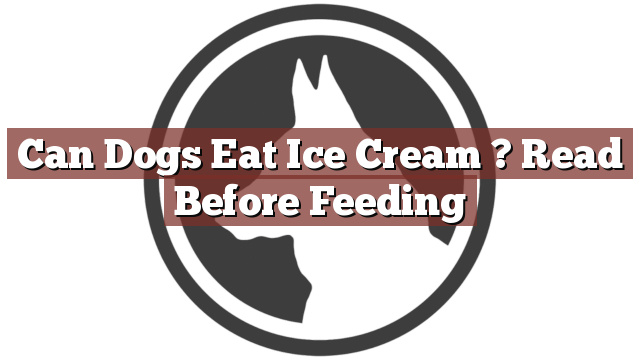Understanding Your Dog’s Dietary Needs
As responsible pet owners, it is crucial to understand the dietary needs of our furry friends. Dogs have different nutritional requirements compared to humans, and it is important to provide them with a balanced diet that fulfills their nutritional needs. While it may be tempting to share our favorite foods with our dogs, it is essential to consider whether certain foods are safe for them to consume. One common question that often arises is, can dogs eat ice cream?
Can Dogs Eat Ice Cream? Read Before Feeding
Can dogs eat ice cream? This is a question that many dog owners ponder. The short answer is no. While ice cream may be a delicious treat for humans, it is not suitable for our canine companions. Ice cream contains ingredients that can be harmful to dogs, such as sugar, dairy, and artificial sweeteners. Dogs lack the necessary enzymes to break down lactose, which can lead to digestive issues such as diarrhea and upset stomachs. Additionally, the high sugar content in ice cream can contribute to obesity, diabetes, and dental problems in dogs.
Pros and Cons of Feeding Ice Cream to Dogs
Feeding ice cream to your dog can have both pros and cons. On the positive side, a small amount of plain, unsweetened, and lactose-free ice cream may be safe for some dogs to consume occasionally. It can be a refreshing treat during hot summer months or as a reward for good behavior. However, it is essential to note that even small amounts of ice cream can pose risks to certain dogs. Dogs with lactose intolerance, diabetes, or obesity should never be given ice cream. Furthermore, some ice cream flavors contain toxic ingredients like chocolate, nuts, or xylitol, which can be extremely dangerous for dogs. It is always best to consult with your veterinarian before introducing any new food into your dog’s diet.
Conclusion
In conclusion, while the idea of sharing a tasty ice cream cone with your dog may seem appealing, it is not recommended. Dogs should not consume ice cream due to its high sugar and dairy content, which can lead to various health issues. Instead, there are many safe and healthy alternatives available for dogs to enjoy, such as frozen fruits, yogurt, or specially formulated dog-friendly frozen treats. As responsible pet owners, it is our duty to prioritize the well-being and health of our furry companions by providing them with a balanced and appropriate diet. So, next time you have the urge to share your ice cream with your canine friend, opt for a safer alternative that will keep them happy and healthy.
Thank you for taking the time to read through our exploration of [page_title]. As every dog lover knows, our furry friends have unique dietary needs and responses, often varying from one canine to another. This is why it's paramount to approach any changes in their diet with caution and knowledge.
Before introducing any new treats or making alterations to your dog's diet based on our insights, it's crucial to consult with a veterinarian about [page_title]. Their expertise ensures that the choices you make are well-suited to your particular pet's health and well-being.
Even seemingly harmless foods can sometimes lead to allergic reactions or digestive issues, which is why monitoring your dog after introducing any new food item is essential.
The content provided here on [page_title] is crafted with care, thorough research, and a genuine love for dogs. Nevertheless, it serves as a general guideline and should not be considered a substitute for professional veterinary advice.
Always prioritize the expert insights of your veterinarian, and remember that the health and happiness of your furry companion come first.
May your journey with your pet continue to be filled with joy, love, and safe culinary adventures. Happy reading, and even happier snacking for your canine friend!

